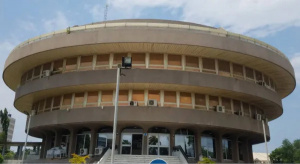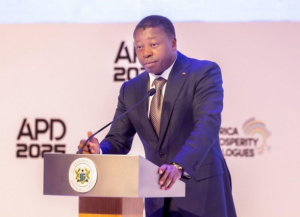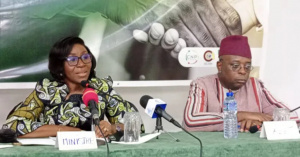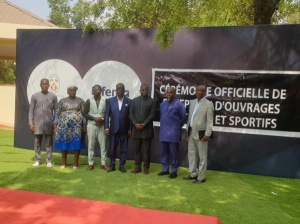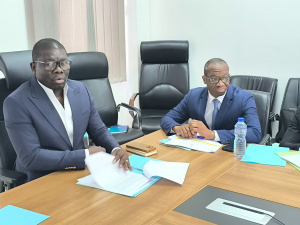Togo First
Umoa-Securities: Togo Seeks CFA25 Billion
Togo plans to raise CFA25 billion on the West African Monetary Union’s public securities market this Friday, February 7. The country’s Treasury will issue short-term government bonds, known as fungible bills (BAT), to secure the funds.
Each bond will have a nominal value of CFA1 million, a three-month maturity period, and varying interest rates. The money raised will help finance Togo’s 2025 budget, which amounts to CFA2,397 billion.
This year, Togo aims to raise a total of CFA332 billion from the regional financial market. So far, it has already secured CFA44 billion through two earlier operations in January, achieving 13% of its annual goal.
Esaïe Edoh
Faure Gnassingbé: “Economic Integration Alone Won’t Solve Africa’s Problems”
Economic integration is important for Africa to build a common market, but it is not enough to fix the continent’s deeper challenges. This was the core message Togolese President Faure Gnassingbé shared at the Dialogues on Prosperity in Africa (APD 2025), held on February 1, 2025, in Accra, Ghana.
President Gnassingbé, a key advocate for the Single Market for Air Transport in Africa (MUTAA) since 2018, shared a three-part plan to make Africa’s economy stronger and more independent.
Beyond Trade
Gnassingbé claimed that regional integration should be a leverage that helps Africa be more resilient to external shocks and become self-sufficient. Setting up a common market, he stressed, should not just be about opening up trade. The move should pair with a balanced model, which ensures a fair distribution of profits among concerned economic stakeholders while integrating key disparities that exist between African countries.
“Economic integration alone won’t solve Africa’s structural problems, like economic inequalities or geographical disparities,” the Togolese leader said. These disparities, he noted, should be integrated into regional development strategies.
To make integration work, Gnassingbé recommends drawing practical solutions that consider these differences and provide support for weaker economies. “The idea is not just to liberalize trade but to build a sovereign economic ecosystem,” he said.
Infrastructure Is Key to Reducing Inequalities
Better infrastructure—roads, ports, railways, and digital networks—is primordial for efficient economic integration and bridge inequalities, Togo’s n°1 said. He thus called for substantial investments in crossborder infrastructure, to link rural and landlocked areas to major economic hubs, and facilitate the movement of goods, services, and capital across the continent.
President Gnassingbé also pushed for creating economic corridors that link industrial and agricultural zones, and he suggested simplifying customs procedures with one-stop shops. In this regard, the African Continental Free Trade Area (AfCFTA seems ideal to coordinate these projects and bolster the continent’s economic cohesion.
Esaïe Doh
Togo Plans Subcontracting Exchange to Support SMEs
The Togolese government and private sector are working together to improve cooperation between large companies and small and medium-sized enterprises (SMEs). At the Subcontracting and Partnerships Forum in Lomé on January 30, 2025, they discussed creating a subcontracting exchange to help SMEs connect with larger companies.
This forum was part of the second edition of the Private Sector Days which gathered government officials, business leaders, financial institutions, and SME representatives. The theme was "Partnership between large companies and SMEs: a lever for economic development." The discussions highlighted the need for a structured system to help SMEs access the markets of larger firms.
On the occasion, Rose Kayi Mivedor, the Minister of Commerce, stressed the importance of supporting the private sector for sustainable development. “Given the private sector’s importance for our country's development, its promotion must remain a priority,” she said.
The proposed subcontracting exchange could be a digital platform where large companies post their subcontracting needs, and qualified SMEs offer their services. Aboki Vignon, President of the Groupement Togolais des Très Petites, Petites et Moyennes Entreprises (GTPME)(Micro, small, and medium-sized business group), pointed out that while SMEs make up 90% of businesses in Togo, they often struggle to join larger value chains. Jonas Daou from the Association des Grandes Entreprisesdu Togo (AGET)(Large business association) added that issues like governance, access to financing, and human resource management hinder the growth of private businesses.
Ayi Renaud Dossavi
Togo: Kifema Capital Funds Sports Complex in Golfe 7
Kifema Capital is funding a new sports complex at Adidogomé High School in the Golfe 7 commune. Construction started recently and is expected to be completed in three months.
The sports complex will include soccer pitches, basketball courts, tennis courts, children's play areas, and a restaurant.
Arthur Trimua, Managing Director of Kifema Capital, explained that the project aligns with Kifema’s ambition to secure investments for key infrastructure. The complex aims to help young people engage in sports and keep them away from idleness and crime. While the project’s cost is unknown, similar complexes are projected in other schools across Togo.
The Togolese government set up Kifema Capital to form strategic partnerships in key development areas. Part of Togo Invest, Kifema was involved in several projects, including a 65 MW Kekeli Efficient power plant.
Esaïe Edoh
Togo: Chamber of Commerce and Industry Wants to Develop SMEs into Big Businesses of the Future
The Chamber of Commerce and Industry (CCI-Togo) wants to increase the number of large companies in Togo to 90% of the economy. The Chamber shared their ambition with Prime Minister Victoire Dogbé on January 30, 2025, in Lomé.
Currently, very small, small, and medium-sized enterprises (VSSMEs) make up about 90% of businesses in Togo. CCI-Togo aims to change this by helping these businesses grow into large companies.
José Symenouh, President of CCI-Togo, believes that existing large companies should help smaller ones succeed. He said, “For example, companies like Ecobank and Zener can pull the smaller ones up.”
To support small and medium enterprises (SMEs), CCI-Togo plans to secure financing and attract foreign investors. They also want to overcome language barriers by creating a “Business Language” center to help Togolese business people communicate with international partners.
As a link between the private sector and the government, CCI-Togo plays an important role in promoting the interests of Togolese businesses. They focus on strengthening trade, industry, and services nationally and internationally.
Esaïe Edoh
Togo Implements Territorial Marketing Strategy in Kpalimé, Kara, and Aného
Togo has launched a territorial marketing strategy to boost the economic and tourism potential of five key towns: Atakpamé, Kpalimé, Blitta, Kara, and Aného. The initiative, led by the Ministry of Industry and Investment Promotion (MIPI) and supported by GIZ, was introduced in Atakpamé on January 30, 2025, by Minister Manuella Santos.
Through the project, the government seeks to reduce the concentration of development in Lomé, the capital, where over 60% of businesses and 71% of jobs are located. This strategy aims to promote regional assets, attract investors, improve infrastructure, develop key industries, and grow tourism. Set to run until 2029, the program will involve setting up special economic zones (ZES), building tourist circuits, and establishing industrial units tailored to each town.
Kpalimé: Tourism and Agribusiness
Kpalimé is known for its natural beauty and handicrafts but lacks structured tourism. There, the project includes building modern hotels, developing ecotourism trails, and improving attractions like Kloto Mountain and Womé waterfalls. Authorities also aim to boost local processing of coffee and cocoa.
Kara: Building a Training and Agro-Industrial Center
Kara is developing into a training and agro-industrial hub. With its university and technical schools, the city aims to train a skilled workforce for the agri-food industry. It is also home to an agropolis development project in its pilot phase. The goal is to create processing units for key crops like cereals, shea, soya, and cotton.
A solar power plant will also be installed in the northern city to meet growing energy demands and ensure a stable power supply for local industries. The plan is to transform Kara into a growth hub for Northern Togo, focusing on training, industrialization, and innovation.
Aného: Ecotourism and Heritage Enhancement
Aného, the former colonial capital, plans to leverage its history and natural beauty to become a tourist destination. The government aims to restore important sites, improve hotel services, and create a tourist circuit linking Aného with cultural sites in neighboring Benin. The program will also promote seaside tourism and introduce ecological initiatives to protect local biodiversity.
Atakpamé: Evolving Agricultural and Industrial Center
Strategically located between the north and south of Togo, Atakpamé is set to become a regional hub for agri-food processing. The town has fertile land suitable for growing yams, vegetables, and tropical fruits, along with a tradition of livestock and fish farming. The goal is to attract industries that can process these products locally, reducing reliance on imports and adding value. Marketing campaigns will encourage investing in road and energy infrastructure to support new businesses. Atakpamé also wants to highlight its cultural assets to attract visitors through nature tourism and handicrafts.
Blitta: Facing Challenges in Setting Up a Special Economic Zone
Blitta, located in central Togo, is a key part of the country’s development plan. With its large land area and low urbanization, the town has a large untapped agricultural potential, especially in cash crops and livestock. To unlock this potential, the government plans to create a special economic zone (ZES) to attract industrial investments and promote local processing of agricultural products.
The strategy also includes upgrading transportation infrastructure and building a logistics network to turn Blitta into an agro-industrial distribution hub. This will require training local workers and improving access to basic services, like electricity and clean water.
The Togolese government has dedicated a budget to promote regional development and enhance territorial branding. This funding will be complemented by significant investments in infrastructure and special economic zones (SEZs), supported through public-private partnerships (PPPs) and international donors.
A Funding Plan to Support Aspirations
To attract investors, the government will organize investment forums in the five target cities, connecting local authorities with national and foreign investors. The strategy emphasizes digital tools, including social media campaigns, multimedia content, dedicated city platforms, and cultural events like festivals.
This ambitious plan aims to rebalance Togo's economic development by leveraging the potential of its regions.
Fiacre E. Kakpo
Togo: SMEs Received CFA17.5 Billion Through ANPGF from 2006 to 2024
Togolese small and medium-sized enterprises (SMEs) received over CFA17.5 billion in funding through the Agence Nationale de Promotion et de Garantie de Financement des PME/PMI (ANPGF) between 2006 and 2024. This information was recently shared by ANPGF, which helps businesses access financing.
These funds came from banks and supported around 1,400 SMEs across various sectors. The ANPGF acts as a middleman to secure this financing, reducing risks for banks and making it easier for entrepreneurs to get loans.
Funding is provided through different methods, including bank loan guarantees, where ANPGF agrees to cover part of the risk for financial institutions. This helps businesses access credit more easily.
Another method is financing through financial institutions (VIF), developed with banks and decentralized finance systems. This service offers tailored solutions for businesses. The ANPGF also provides participative loans for SMEs needing long-term support.
In addition to funding, the ANPGF helps entrepreneurs build their skills. Every year, about 3,000 project leaders receive training and advice to address challenges in starting or growing their businesses.
The ANPGF reports to the Ministry of the Economy and Finance and is essential in promoting SMEs in Togo, as it works, continuously, with over 2,500 of these businesses.
Esaïe Edoh
Togo: The Tax Office Revenues Urges Vehicle Owners to Pay TVM by March 31, 2025
According to the Togolese Revenues Office (OTR), vehicle owners in Togo must settle the Motor Vehicle Tax (MVT) by March 31, 2025, before inspections start on April 1.
The payment process for the TVM has been fully digital since last year, as part of efforts to modernize tax collection. The OTR encourages everyone to use its online platform to avoid delays and penalties.
The TVM ranges from 5,000 to CFA40,000, depending on the vehicle type. It applies to all registered vehicles in Togo, including motorcycles over 125 cm³, tricycles, commercial vehicles, trucks, buses, and heavy goods vehicles.
Introduced in 2019, the MVT is important for maintaining the national road network and supports the Société Autonome de Financement de l'Entretien Routier (SAFER). In the first quarter of 2024, the TVM generated CFA1.35 billion before inspections began.
Togo to Conduct Fourth Demographic and Health Survey in 2025
The Togolese Ministry of Health announced that Togo is gearing up for its 4th Demographic and Health Survey (EDST-IV) this year. The EDST-IV steering committee held its first meeting on January 28. It recorded the participation of the Ministry of Planning and various technical and financial partners and was led by the Minister of Health and Public Hygiene, Prof. Tchin Darre.
The EDST-IV is part of the International Demographic Health Surveys (DHS) program and will be overseen by the National Statistics Institute, the INSEED. The survey aims to gather reliable and current data on key health indicators, including maternal and child health, healthcare access, vaccination rates, and disease prevalence.
This fourth survey follows earlier editions conducted in 1988, 1998, and 2013-2014. The results will help shape public health policies and development strategies in Togo.
Ayi Renaud Dossavi
Chad Seeks Togo's Backing for AfDB Presidency
Chad is actively seeking support from Togo for its candidacy for the presidency of the African Development Bank (AfDB). On January 28, 2025, Chad's Prime Minister, Allamaye Halina, met with President Faure Gnassingbé in Lomé on January 28 to discuss this matter.
Halina conveyed a message from Chad's leaders, expressing confidence that Togo's diplomatic influence could help secure support for Chad's bid. "Chad has presented a candidate for the presidency of the AfDB and naturally, President Mahamat Idriss Déby Itno is counting on the support and leadership of his brother Faure Gnassingbé," Halina said after the meeting.
Chad's candidacy already has backing from the Economic and Monetary Community of Central Africa (CEMAC) and the Economic Community of Central African States (ECCAS). However, gaining support from the Economic Community of West African States (ECOWAS) would further strengthen its position. N'Djamena believes Togo can play a crucial role in influencing its West African partners.
The outgoing AfDB president, Akinwumi Adesina of Nigeria, has been in office since September 2015. His term ends this year, with the next president to be elected by the AfDB's Board of Governors on May 29, 2025, during its Annual Meeting in Abidjan, Côte d'Ivoire.
Esaïe Edoh

